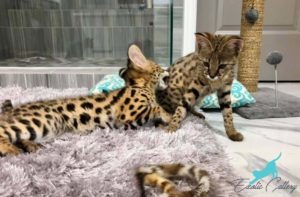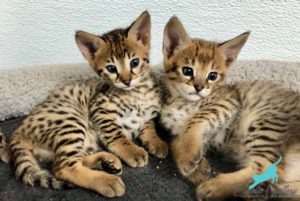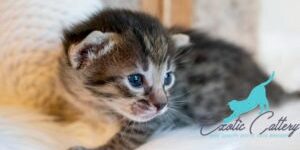Discover the Amazing Savannah Cat Hybrid: A Unique Companion!
Have you ever wondered about the fascinating world of Savannah cats? These unique felines are not just your ordinary house pets; they are a hybrid cat breed that captures the hearts of many with their striking appearance and playful demeanor.
Understanding hybrid breeds like the Savannah cat hybrid is essential for anyone considering adding one to their family.
What is a Savannah Cat?
A Savannah cat is the result of an extraordinary cross between a wild Serval and a domestic cat.
This breed emerged in the late 20th century, with the first successful breeding occurring in 1986 by Judee Frank, who crossed a male Serval with a domestic Siamese cat.
The offspring, aptly named Savannah, set the stage for what would become one of the most sought-after exotic cat breeds in the world.
The Serval plays a crucial role in the lineage of the Savannah cat.

Why Choose a Savannah Cat Savannah vs Serval Kitten Comparison
Generations of Savannah Cats
When it comes to Savannah cats, the generation matters.
The F1, F2, and F3 designations indicate how many generations removed the cat is from its Serval ancestor.
- F1 Savannah cats are the first generation, meaning they are 50% Serval and 50% domestic cats.
- F2 cats are 25% Serval, and F3 cats are 12.5% Serval.
As you move further down the generations, the characteristics and behavior of the cats can change significantly.
For instance, F1 and F2 cats tend to be larger and retain more of the wild traits from their Serval parent, while later generations are generally smaller and more domesticated.
Savannah cat Characteristics
Let’s talk about what makes the Savannah cat so visually stunning.
- Size: Depending on their generation, Savannah cats can weigh anywhere from 10 to 25 pounds, with F1 and F2 males often reaching sizes comparable to small dogs.
- Coat Patterns: The coat of a Savannah cat is typically short, dense, and adorned with beautiful spots, reminiscent of their Serval ancestry.
- Comparison with Domestic Cats: Unlike typical domestic cat breeds, such as the Maine Coon or Norwegian Forest cat, Savannahs have a more exotic look.
Their large ears, long legs, and distinctive markings make them stand out in any setting.
Savannah cats are not just a pretty face; they also possess a personality that’s as captivating as their appearance.
With a mix of independence and loyalty, these cats can be affectionate with their owners while maintaining a playful, curious nature.
This makes them an excellent choice for active families or individuals who appreciate a cat with a bit of wild spirit.

Reputable Exotic Kitten Breeder
Why Understanding Hybrid Cats Matters
Understanding the nuances of hybrid cats like the Savannah cat hybrid is crucial for potential owners.
These cats may require more attention, care, and understanding than traditional domestic breeds.
- Behavioral Traits: The wild ancestry of Savannah cats means they can exhibit behaviors that are less common in domestic cats, such as a higher energy level and a need for mental stimulation.
- Legal Considerations: Some states have restrictions on owning hybrid cats, particularly F1 and F2 generations. It’s essential to check local laws before bringing one home.
- Care Requirements: Their unique genetics may also influence their dietary needs and health care. For instance, they thrive on a diet that mimics what they would eat in the wild, often requiring more protein than typical domestic cat food.
Temperament and Behavior
When it comes to the Savannah cat hybrid, understanding their temperament and behavior is key to ensuring a harmonious home.
These cats are known for their vibrant personalities that can be both engaging and challenging.
General Personality Traits
Savannah cats are often described as energetic, playful, and intelligent.
- They have a strong sense of curiosity and love to explore their surroundings, making them more dog-like in their behavior.
- Their playful nature means they enjoy interactive toys and games, and they can entertain themselves for hours if given the right stimulation.
- Many owners report that their Savannah cats are affectionate and form strong bonds with their families, often following them around the house.
However, it’s important to note that their wild ancestry can lead to some unique behavioral traits.
- They may tend to climb, jump, and explore high spaces, so providing vertical space in your home is essential.
- Some Savannah cats can be vocal, using a range of sounds to communicate their needs and desires.
Socialization Needs and Compatibility with Families
Savannah cats thrive on social interaction and should be well-socialized from a young age.
- Introducing them to various people, pets, and environments can help them develop into well-rounded companions.
- They often get along well with children and other pets, especially if they are raised together.
However, due to their energetic nature, they may not be the best fit for very young children who might not understand how to interact with them gently.
Care and Maintenance
Caring for a Savannah cat hybrid involves understanding their specific needs.
These cats require a bit more effort than your average domestic breed, but the rewards are well worth it!
Dietary Needs
A proper diet is crucial for the health and well-being of your Savannah cat.
- These cats thrive on high-protein diets, often requiring food that mimics their natural prey.
- Look for high-quality cat food that lists meat as the primary ingredient, and consider incorporating raw or freeze-dried options for added nutrition.
Grooming Requirements
While Savannah cats have relatively short hair, they still need regular grooming.
- A weekly brushing can help reduce shedding and keep their coat healthy.
- Regular dental care is also important, as dental health can impact their overall well-being.
Exercise and Mental Stimulation
Savannah cats are active and intelligent, meaning they need plenty of exercise and mental stimulation to stay happy.
- Interactive toys, puzzle feeders, and climbing trees can help keep their minds engaged.
- Daily play sessions are essential, as these cats love to chase and pounce.
Consider setting aside time each day for interactive play to help them burn off energy and bond with you.

Why Choose a Savannah Cat Savannah vs Serval Kitten Comparison
Legal Considerations
Before bringing a Savannah cat hybrid into your home, it’s important to understand the legal landscape surrounding hybrid cats.
- Some states and municipalities have specific regulations regarding the ownership of hybrid breeds, particularly F1 and F2 generations.
- Always check local laws to ensure you can legally own a Savannah cat in your area.
Where They Can Be Legally Owned
In many places, F3 and later generations of Savannah cats are generally more accepted and easier to own legally.
- However, F1 and F2 cats may face restrictions or outright bans in certain states.
- It’s crucial to do your research and consult with local authorities or breeders to understand what is permissible in your area.
The Savannah cat hybrid is a truly unique breed that combines the best traits of both wild and domestic cats.
If you’re ready for an active, affectionate companion who loves to explore and play, a Savannah cat might just be the perfect addition to your family.
So, if you’re considering a new feline friend, take a closer look at the Savannah cat hybrid—you might just find your perfect match!







